Simplyphytoplankton - Simply Phytoplankton

More Posts from Simplyphytoplankton and Others

Phytoplankton (Coccolithophore) bloom!

Phytoplankton bloom in the Bay of Biscay.
The waters off the western coast of France show swirls of green and turquoise as a result of a phytoplankton bloom associated with increasing springtime temperatures.
Keep reading
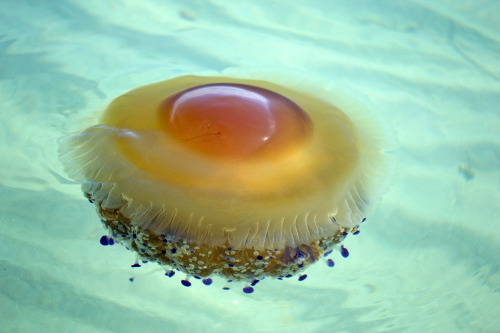

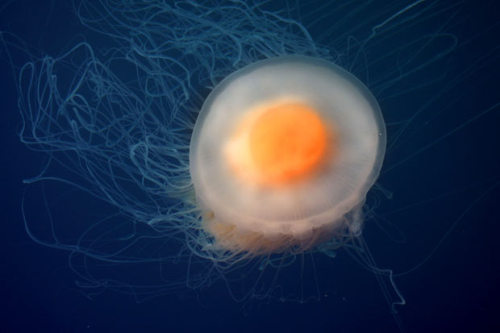
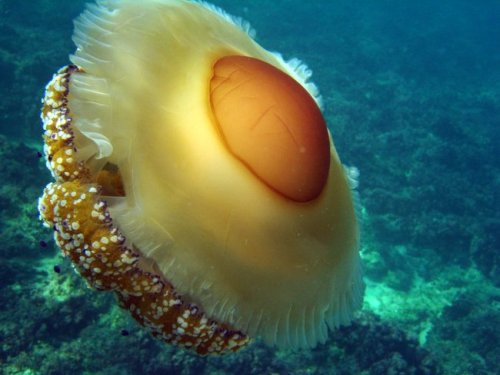
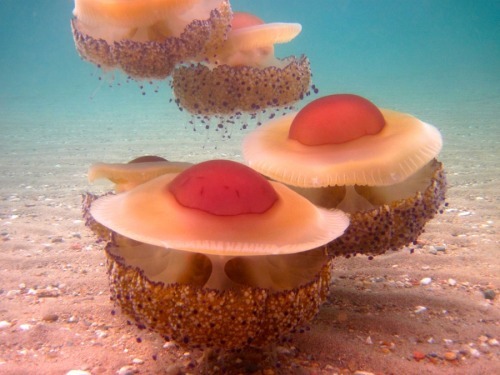
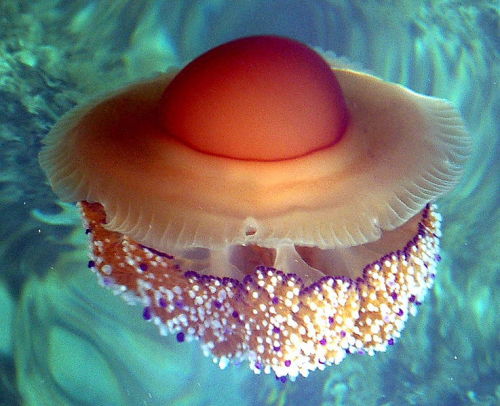
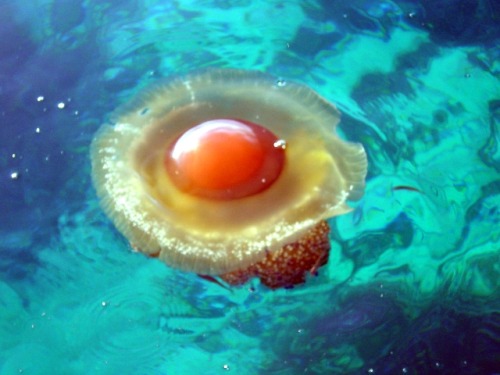
Fried Egg Jellyfish Are Kind of Adorable – & That’s No Yolk.
There are two species that hold the whimsical title of “Fried Egg Jellyfish”: Phacellophora camtschatica and Cotylorhiza tuberculata though the two are quite different from each other in all aspects beside appearance.
Phacellophora camtschatica is a huge jelly that prefers colder waters. It’s bell can reach up to 2 ft across and its dozens of tentacles reach over 20 ft long! If you don’t think this floating egg creature looks very menacing, you’d be right. It has a very weak sting and many small crustaceans take advantage of the jelly by riding on its bell (breakfast to go…?) while snatching up extra food.
Cotylorhiza tuberculata is a much smaller jellyfish that hangs out in warmer waters. It only reaches about 35 cm in diameter, so don’t go for this Fried Egg Jelly if you want a big breakfast. Unlike most jellyfish, C. tuberculata can swim on its own, without relying on the currents for movement. It’s sting (if you can even call it that) is so feeble that it has very little to no effect on humans at all. I mean, it does look like a breakfast food, after all… how powerful could it be?
Delta
Flight 1235- 12:05pm
Harrisburg to Atlanta
Right now, my first flight is almost over and we will soon land in Atlanta. I should be on my way to Atlanta. But I am not on that flight. I am sitting in Harrisburg International Airport (Canada counts).
IFSA-Butler sent everyone multiple emails in the months leading up to departure about visas. Each email was clear and concise, and I reread everyone to make sure there was nothing else I had to do. So, it was surprising (and very stressful) when the boarding agent would not allow me on the plane because I didn't have a visa. I told him I didn’t need one and showed him the documents from IFSA-Butler. Nope. He needed something from the Costa Rican government. So I called IFSA-Butler and my advisor told me the same thing every email said. I didn’t need a visa because I would apply for a tourist visa after landing in San Jose and then apply for an extension of it.
I told the agent this, but he needed official documentation. I relayed the message that he could call the Costa Rican Consulate and they would verify what I was saying. That wasn't his responsibility (I'd like to point out here that if I called and tried to tell him what they said, he would have had to speak with them to verify it, meaning it technically was his responsibility). As everyone was boarding, one kind stranger showed the agent the website of the Costa Rican Embassy saying that you did not need a visa to enter the visa and you would apply for a visa after landing. He said that the date of my departure was after the 90-day tourist visa expired. I repeated that I would get an extension in Costa Rica and it was impossible for me to have a tourist visa before arriving in Costa Rica (from what IFSA-Butler told me).
By the time my advisor got me documentation from Costa Rican immigration and emailed it to me, it was too late. Oh, and it was in Spanish and they would have had to find a way to translate it since I would not be able to. And my bag was on the plane.
So here I am, sitting in Harrisburg International Airport after figuring out how I would get to Costa Rica. Everything is taken care of now after many phone calls and my flight is tomorrow at 3:34pm out of Washington, D.C. But my back won't be back until 5ish and I'm waiting for my parents to comeback.
So I will conclude by quoting my travel agent at Advantage Travel (IFSA's travel agency), "Delta can go pound salt."
Fellow Study Abroad Students
Most Common Profile
Fellow Students
My Background
Adjustments
The most common profile in study abroad is students from "elite colleges, white, female, major in arts/humanities, and have highly educated parents." Let's see how that compares to me. I am from a small liberal arts school (does that count as elite?), I am white (check), male (nope), I have majors in biology (nope) and Spanish (check), and both of my parents completed high school but never went to college so they would not be considered highly educated.
Now, compared to my fellow study abroad students, that profile fits a bit more. Girls out number guys by slightly more than 2 to 1, most of us are white, I think there are two science majors max (including myself), we have representatives from American University and other liberal arts schools, and I know at least some of them have parents that are medical doctors or have a doctorate in the arts or humanities. This is my first time outside the United States, but I know that at least five others have spent at least a few weeks outside of the U.S. at some point in their lives. So overall, everyone else is more well-traveled than me.
In general, I usually do not think that my background as a first generation college student affects my interactions with my peers. I think it's a little awkward when someone says that their father is a doctor or that their father has a Ph.D. in Philosophy, but usually, it's just someone that comes up in a casual conversation and they do not expect me to say what my parents do.
I think that I have learned to be independent and I usually do not rely on others when navigating the college system, and I think that is probably also true for learning how to adjust to life abroad. I just need some time and I make the adjustments on my own. I'm sure that the students that have been abroad may be able to adjust easier, but I don't really know if it is that different from my fellow study abroad students.
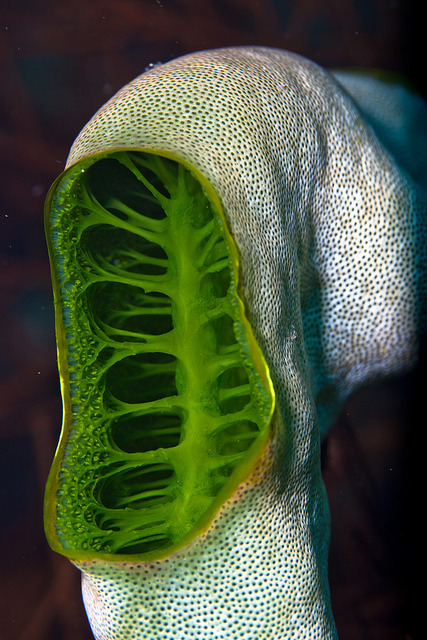
By a 3-0 vote, the 9th U.S. Circuit Court of Appeals said the government fell short of the “high bar” needed to dismiss the Oregon case, originally brought in 2015 against the administration of President Barack Obama.
Twenty-one children and young adults, ages 11 to 22, accused federal officials and oil industry executives of violating their due process rights by knowing for decades that carbon pollution poisons the environment, but doing nothing about it.
The government contended that letting the case proceed would be too burdensome, unconstitutionally pit the courts against the executive branch, and require improper “agency decision-making” by forcing officials to answer questions about climate change.
But the appeals court said the issues raised “are better addressed through the ordinary course of litigation.”
A trial is scheduled for Oct. 29 in the federal court in Eugene, Oregon.
President Donald Trump’s administration also has asked the U.S. Supreme Court to dismiss the lawsuit or put it on hold, and is awaiting a ruling. Its earlier bid to end the lawsuit failed in March.


Bioluminescent Dinoflagellates
(source)
Diatoms: Algae in glass houses
Check out my new post!
http://becausephytoplankton.blogspot.com/2018/09/diatoms-algae-in-glass-houses.html
-
 almondmilklatte reblogged this · 3 weeks ago
almondmilklatte reblogged this · 3 weeks ago -
 joshay98 liked this · 3 weeks ago
joshay98 liked this · 3 weeks ago -
 bugs-and-other-animals reblogged this · 3 weeks ago
bugs-and-other-animals reblogged this · 3 weeks ago -
 gliophorus-psittacinus liked this · 4 weeks ago
gliophorus-psittacinus liked this · 4 weeks ago -
 gloomingblossomousia reblogged this · 4 weeks ago
gloomingblossomousia reblogged this · 4 weeks ago -
 decayingdogt33th liked this · 4 weeks ago
decayingdogt33th liked this · 4 weeks ago -
 houseofcatwic liked this · 4 weeks ago
houseofcatwic liked this · 4 weeks ago -
 thorned-urchin reblogged this · 4 weeks ago
thorned-urchin reblogged this · 4 weeks ago -
 gebtoons reblogged this · 4 weeks ago
gebtoons reblogged this · 4 weeks ago -
 addisayshi liked this · 4 weeks ago
addisayshi liked this · 4 weeks ago -
 heavy-moon reblogged this · 4 weeks ago
heavy-moon reblogged this · 4 weeks ago -
 nightheavy liked this · 4 weeks ago
nightheavy liked this · 4 weeks ago -
 h1gh3rth4nm05t reblogged this · 4 weeks ago
h1gh3rth4nm05t reblogged this · 4 weeks ago -
 scentedstrawberries reblogged this · 4 weeks ago
scentedstrawberries reblogged this · 4 weeks ago -
 scentedstrawberries liked this · 4 weeks ago
scentedstrawberries liked this · 4 weeks ago -
 iammoremylrds reblogged this · 4 weeks ago
iammoremylrds reblogged this · 4 weeks ago -
 desorbitad0 reblogged this · 4 weeks ago
desorbitad0 reblogged this · 4 weeks ago -
 desorbitad0 liked this · 4 weeks ago
desorbitad0 liked this · 4 weeks ago -
 arcaline reblogged this · 1 month ago
arcaline reblogged this · 1 month ago -
 marinecorvid liked this · 1 month ago
marinecorvid liked this · 1 month ago -
 jeremy-lemon liked this · 1 month ago
jeremy-lemon liked this · 1 month ago -
 uottalikeit liked this · 1 month ago
uottalikeit liked this · 1 month ago -
 afrocowboyyyy liked this · 1 month ago
afrocowboyyyy liked this · 1 month ago -
 rivercreature liked this · 1 month ago
rivercreature liked this · 1 month ago -
 betterthanakickintheface reblogged this · 1 month ago
betterthanakickintheface reblogged this · 1 month ago -
 betterthanakickintheface liked this · 1 month ago
betterthanakickintheface liked this · 1 month ago -
 ghostpyre reblogged this · 1 month ago
ghostpyre reblogged this · 1 month ago -
 cobaltedbeast reblogged this · 1 month ago
cobaltedbeast reblogged this · 1 month ago -
 wokeuptraveledstraightintothesun reblogged this · 1 month ago
wokeuptraveledstraightintothesun reblogged this · 1 month ago -
 sharkkweak reblogged this · 1 month ago
sharkkweak reblogged this · 1 month ago -
 sharkkweak liked this · 1 month ago
sharkkweak liked this · 1 month ago -
 salmonsnakerune reblogged this · 1 month ago
salmonsnakerune reblogged this · 1 month ago -
 kittyforth reblogged this · 1 month ago
kittyforth reblogged this · 1 month ago -
 voidcreatureinthevoid liked this · 1 month ago
voidcreatureinthevoid liked this · 1 month ago -
 thewitch2077 reblogged this · 1 month ago
thewitch2077 reblogged this · 1 month ago -
 popatotoast reblogged this · 1 month ago
popatotoast reblogged this · 1 month ago -
 lukewarm-lesbian reblogged this · 1 month ago
lukewarm-lesbian reblogged this · 1 month ago -
 lukewarm-lesbian liked this · 1 month ago
lukewarm-lesbian liked this · 1 month ago -
 s4intjust liked this · 1 month ago
s4intjust liked this · 1 month ago -
 yallwedead reblogged this · 1 month ago
yallwedead reblogged this · 1 month ago -
 yallwedead liked this · 1 month ago
yallwedead liked this · 1 month ago -
 harborchild reblogged this · 1 month ago
harborchild reblogged this · 1 month ago -
 usagiyojumbo reblogged this · 1 month ago
usagiyojumbo reblogged this · 1 month ago -
 vampiremasochist reblogged this · 1 month ago
vampiremasochist reblogged this · 1 month ago -
 vampiremasochist liked this · 1 month ago
vampiremasochist liked this · 1 month ago -
 catasticalcalamity liked this · 1 month ago
catasticalcalamity liked this · 1 month ago -
 corvidares reblogged this · 1 month ago
corvidares reblogged this · 1 month ago -
 thewolfgrowssunflowers reblogged this · 1 month ago
thewolfgrowssunflowers reblogged this · 1 month ago -
 thewolfgrowssunflowers liked this · 1 month ago
thewolfgrowssunflowers liked this · 1 month ago

Blog dedicted to phytoplankton. Phytoplankton are microscopic organisms that are responsible for half of the photosynthesis that occurs on Earth. Oh, and they look like art... Follow to learn more about these amazing litter critters! Caution: Will share other ocean science posts!Run by an oceanographer and phytoplankton expert. Currently a postdoctoral researcher.Profile image: False Colored SEM image of Emiliania huxleyi, a coccolithophore, and the subject of my doctoral work. Credit: Steve Gschmeissner/ Science Photo Library/ Getty ImagesHeader image: Satellite image of a phytoplankton bloom off the Alaskan Coast, in the Chukchi SeaCredit: NASA image by Norman Kuring/NASA's Ocean Color Web https://earthobservatory.nasa.gov/images/92412/churning-in-the-chukchi-sea
158 posts

